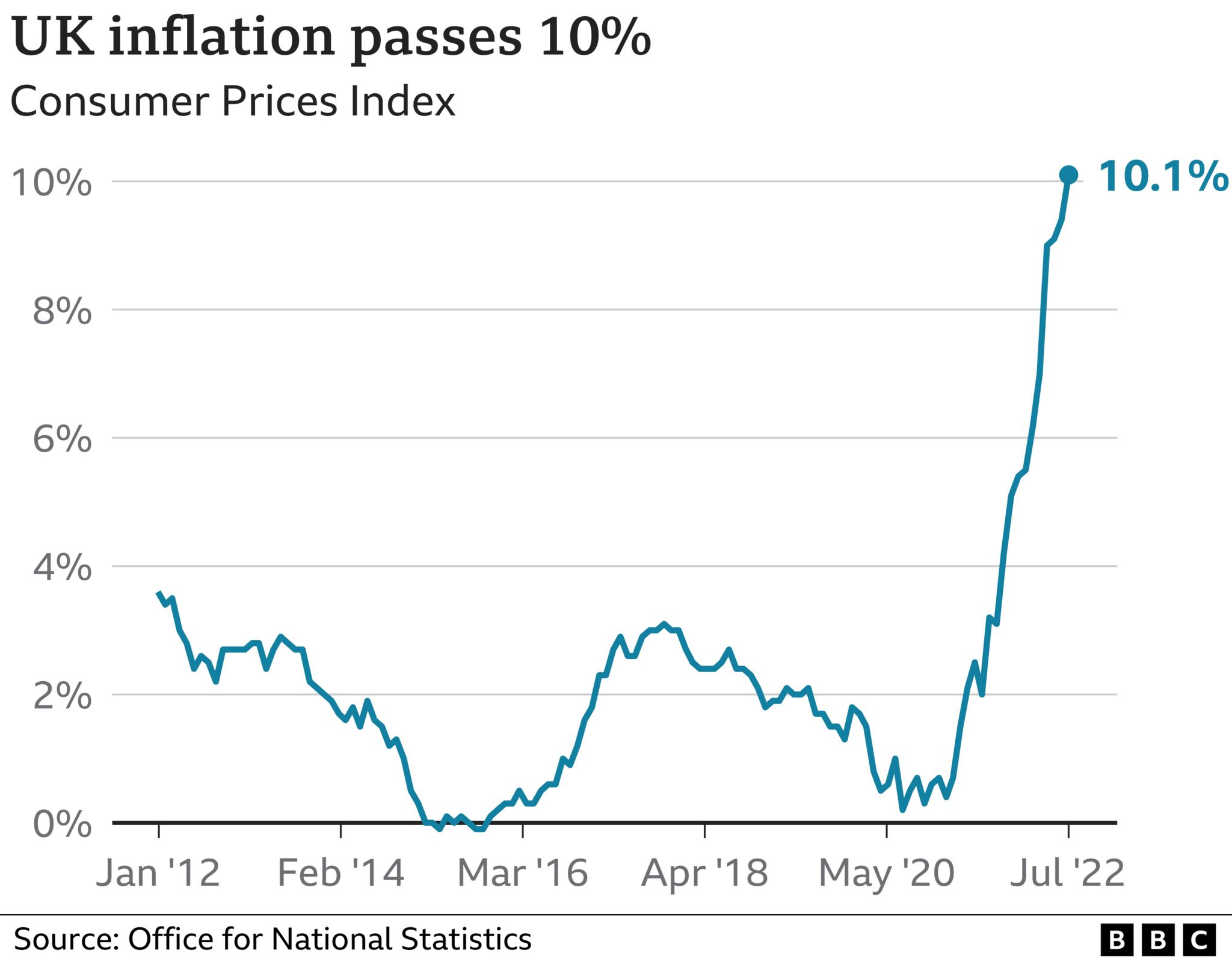The Bank of England says the recent increases in energy bills, which are set to be three times more than they were a year ago, will drive inflation - the rate at which prices rise - even higher, to 13%.
The increase in the cost of living is putting a squeeze on people's finances, as wages fail to keep up.
What is inflation?
Inflation is the increase in the price of something over time.
For example, if a bottle of milk costs £1 and that rises by 5p compared with a year earlier, then milk inflation is 5%.
Every month a figure is released, estimating how much prices are rising overall - it's currently at 10.1%.

Why are prices rising so fast?
The Bank of England's governor Andrew Bailey has said "the Russia shock is now the largest contributor to UK inflation". But economists agree that there are many factors, including:
energy bills, which have risen rapidly because of high oil and gas prices. They're expected to increase sharply again from October when the price cap is next reviewed petrol and diesel prices, partly because the war in Ukraine has driven up the cost of crude oil. Prices recently fell from record levels but are expected to remain high food prices, as the war in Ukraine squeezes grain production and costs the cost of used cars has also gone up sharply significant increases in the costs of raw materials, household goods, and furniture and in the hospitality sector, including restaurants and hotels higher interest rates which are making mortgage payments more expensive for some homeowners. Not all prices behave the same way. The cost of some other goods and services have increased only slightly or stayed the same.
What's happening to wages?
Pay increases for many people aren't keeping up with rising prices.
Average wages, not including bonuses, rose by 4.7% in the year to June 2022.
But when you take inflation into account, the real value of that pay actually fell by 3% compared to 12 months ago.
Pay including bonuses was down 2.5%, when adjusted for inflation.
Who measures the UK's inflation rate?
To come up with an inflation figure, the ONS keeps track of the prices of hundreds of everyday items. This is known as the "basket of goods".
The basket is constantly updated. Tinned beans and sports bras were added this year, reflecting a rising interest in plant-based diets and exercise.
Each month's inflation figure shows how much these prices have risen since the same date last year. This is known as the Consumer Prices Index (CPI).

What's happening in other countries?
Other countries are also experiencing a cost of living squeeze.
Many of the reasons are the same: increased energy costs, shortages of goods and materials and the fallout from Covid.
The ONS says UK inflation is similar to the European Union average.
In the eurozone, the latest estimate of annual inflation was 8.6%.
In the United States, inflation hit 9.1% in the 12 months to June - a 40-year high, the US Labor Department said.
When will inflation come down?
Despite predicting that inflation will go higher in the autumn, the Bank of England says the "current high rates of inflation are not likely to last".
It forecasts inflation will peak this winter at 13.1% - then fall to 2% in about two years.
But not all economists are so sure. Historically, when inflation has risen above 9% it has taken years, not months, to recover.
What can be done to tackle inflation?
The Bank of England's traditional response to rising inflation is to raise interest rates. This can encourage people to save, but means some people with mortgages see their monthly payments go up.
How high could UK interest rates go?
New chancellor pledges to control rising prices
Raising interest rates also makes borrowing more expensive and - it is hoped - people have less money to spend. As a result, they will buy fewer things and prices will stop rising as fast.
But when inflation is caused by things like rising energy prices worldwide, there is a limit as to how effective UK interest rate rises can be in slowing inflation.
Retrieved from: https://www.bbc.com/news/business-12196322 (17 Aug, 2022)
The information provided on this website is for reference only. C21 International shall not be liable for any errors, omissions, misstatements, or misrepresentations (express or implied), concerning any Information, and shall not have or accept any liability, obligation, or responsibility whatsoever for any loss, destruction, or damage (including without limitation consequential loss, destruction or damage) howsoever arising from or in respect of using, misusing, inability to use, or relying on the Information.

